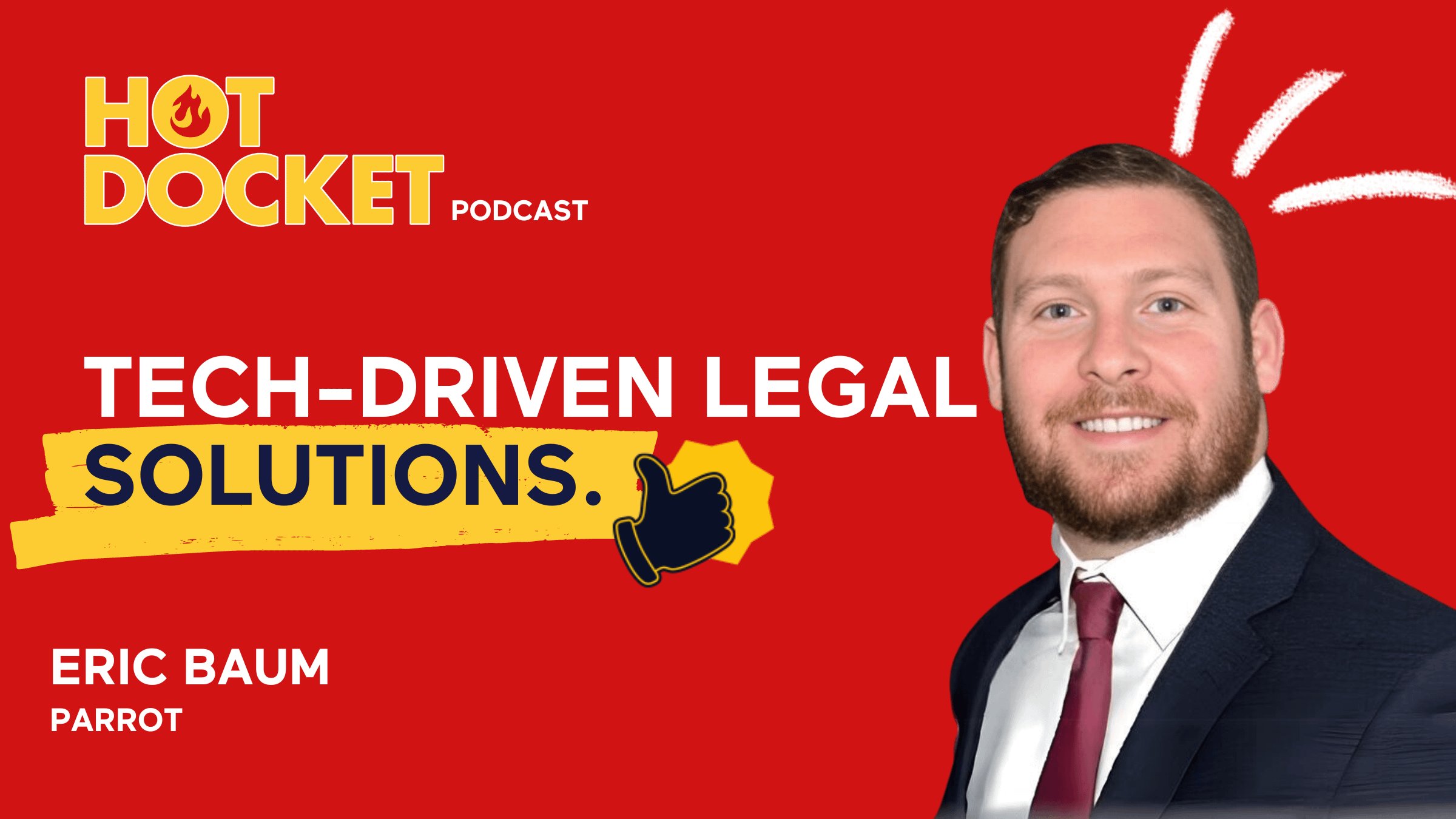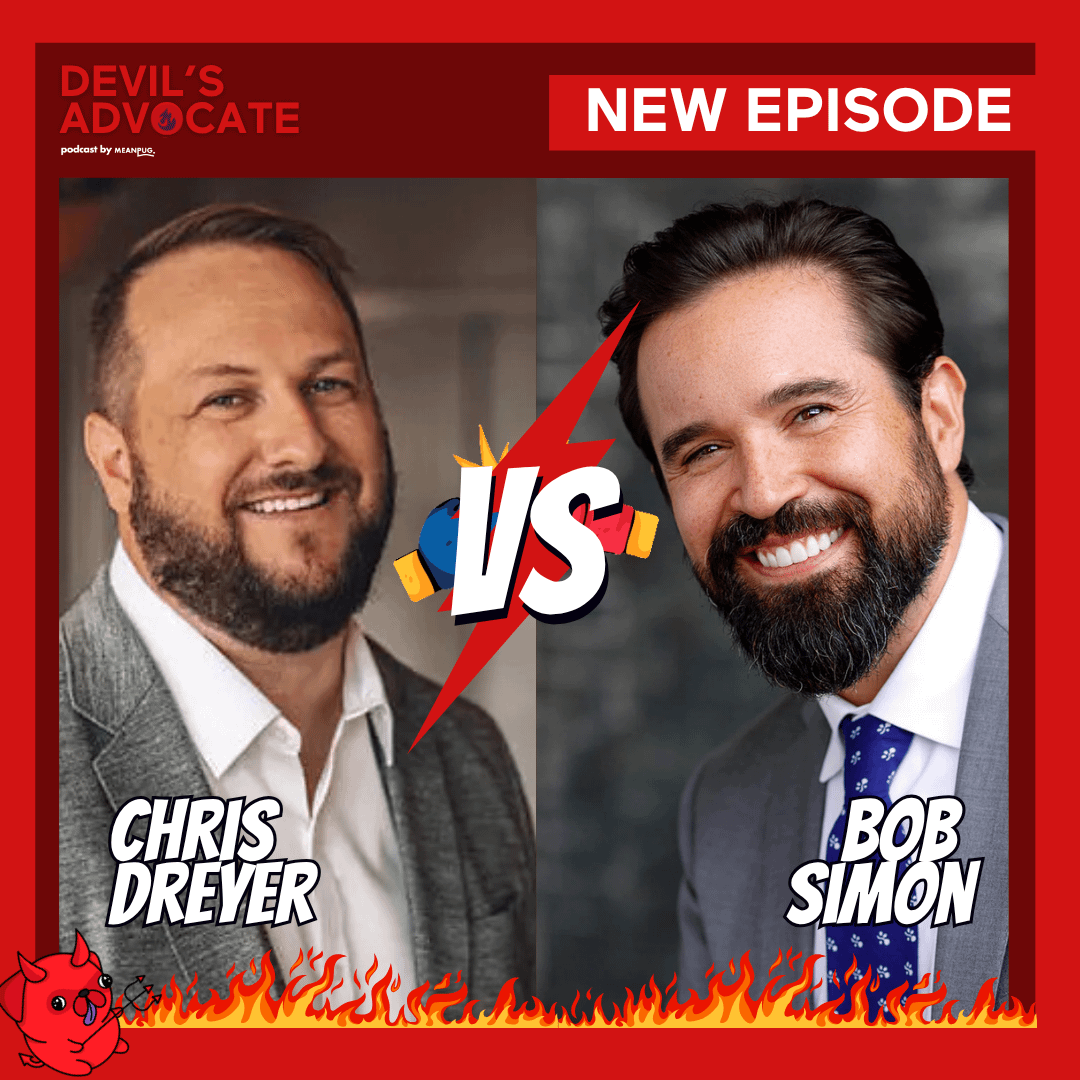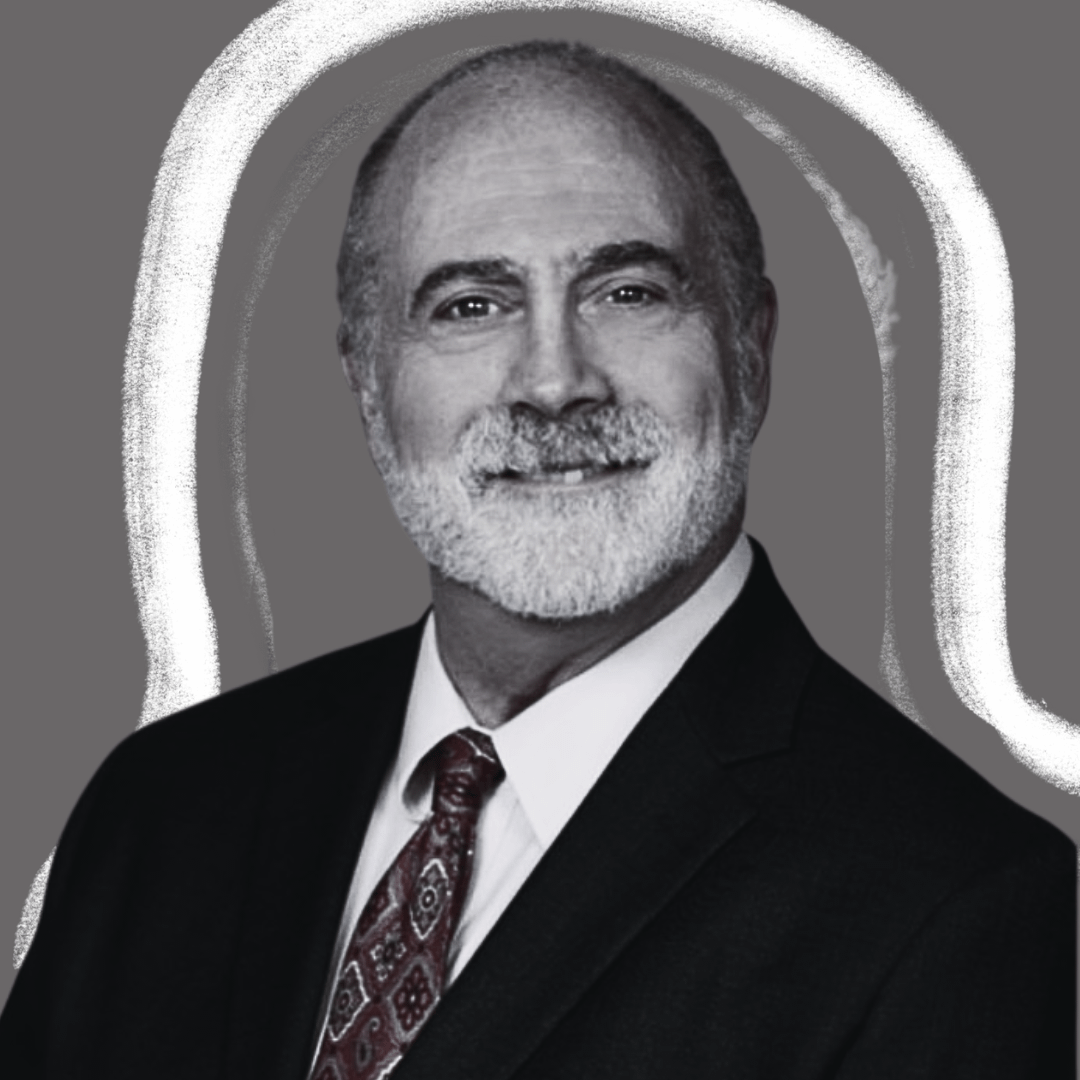
Episode Overview
Have you ever considered how much time and money artificial intelligence could save your legal practice?
As the legal industry rapidly evolves, All are under increasing pressure to modernize and streamline their operations. Whether it’s optimizing billable hours or embracing remote depositions, the influence of technology on the law is undeniable.
In this episode, we welcome Eric Baum, the enterprising founder of Parrot, a pioneering company reshaping the future of legal technology and court reporting.
We’ve invited Eric to dive deep into how his platform is transforming these essential aspects of the legal profession. With a staggering $14 million raised and collaborations with multiple national insurance carriers, Eric’s journey from a lawyer specializing in sex crimes and human trafficking to a tech entrepreneur, highlights an impressive shift from legal practice to legal innovation.
Episode Links
Want to hear more from elite lawyers and industry-leading marketers?
Follow us on Social Media for more
Episode Topics
- Unlocking Innovation: Parrot’s journey from traditional to modern court reporting
- Empowering Relationships: Eric Baum’s insights on personalized sales and client understanding
- The Certified Advantage: Navigating technology and the role of certified reporters
- Virtual Vistas: Embracing remote depositions in today’s legal landscape
- Building Bridges: Parrot’s genesis and response to the call for accessible justice
- Trust Building in Legal Tech: Strategies and community engagement
- Balancing Act: Work-Life harmony in the high-pressure legal sector
- Fun and Insightful: A light-hearted word association with Eric Baum
Key Takeaways
- Discover how AI-driven tools can enhance billable hour accuracy and reduce overhead costs, empowering All to operate more efficiently.
- Explore the benefits of remote deposition platforms like Parrot’s, which save time and travel costs while maintaining deposition quality and accessibility.
- Learn how to leverage inbound marketing and community referrals to build trust and foster adoption of new legal technologies, enhancing efficiency and client satisfaction.
- Embrace the potential of legal tech to streamline operations, stay competitive, and deliver exceptional services to clients, driving growth and success in the legal industry.
Episode Transcript
[00:00:00] Eric Baum
Using artificial intelligence is just a natural step in the evolution of the
legal profession. You want to use reliable, secure forms of it.
[00:00:10] Bobby Steinbach
Welcome to Hot Docket, the show where we talk about winning marketing strategies
that have built the most successful All.
[00:00:16] Andrew Nasrinpay
Join us every two weeks for the latest trends and tactics to grow your law firm.
[00:00:21] Bobby Steinbach
Hey everybody, and thanks for joining us today. We’re going to be talking
to Eric Baum, the founder of Parrot Tech, a remote deposition platform for
attorneys, to go over his tech platform that he’s built to enable
attorneys to conduct remote depositions. We’ll talk everything from the
marketing and the sales of it, All the way through to what it means to balance
your work, your family, everything you’ve got going on.
[00:00:44] Bobby Steinbach
We’re going to learn
[00:00:45] Andrew Nasrinpay
about some of the changes in the remote deposition space and how that’s
impacting lawyers on both the defense and billable hour side, all the way to the
plaintiff
[00:00:54] Bobby Steinbach
side. Very excited for you folks to listen today.
[00:01:02] Eric Baum
Thanks for joining us, Eric. Thank you so much for having me. It was very nice
to see you guys, Bobby, Andrew. Thank you so much for having me on. I’m
excited to, I’m excited to join you guys today. Awesome.
[00:01:10] Bobby Steinbach
So, I think I’d be remiss if I didn’t start by just asking, you
know, why did you get started? You’re a trained lawyer.
[00:01:17] Bobby Steinbach
What made you jump into, uh, building a tech platform?
[00:01:20] Eric Baum
So I was a, right out when I went to University of Miami for law school. Um, I
was always interested in stopping bad people that were hurting other people,
hurting kids particularly. I volunteered in Haiti after the earthquake. I lived
down in Port au Prince for like six, seven months and just being at the hospital
there experienced and saw some really terrible things.
[00:01:37] Eric Baum
Kids, women, girls that are being taken advantage of. Because of the terrible
infrastructure there, I went to law school to try to hold people accountable
that we’re doing bad things to innocent people. Um, started to get
internships at the prosecutor’s office, homicide division, human
trafficking, and knew that I wanted to be a sex crimes prosecutor for a long
time.
[00:01:57] Eric Baum
And so I went to the Palm Beach County State Attorney’s Office with Dave
Ehrenberg, Adrian Ellis, all wonderful leaders. and worked my way up to the
Special Victims Unit. I was prosecuting internet crimes against children,
trafficking cases, and sex crimes.
[00:02:11] Bobby Steinbach
What made you think that this was the right move?
[00:02:14] Bobby Steinbach
My
[00:02:14] Eric Baum
whole trajectory, the whole life, everything I’ve always wanted to do was
helping people and then making things better. And so after about seven and a
half, eight years there, My brother, who’s a tech entrepreneur, has
started a lot of different companies, and is very successful. You know, asked
me one day, he said, what is the most, and this is the same question that I ask
anybody else that asks, you know, how do you start a company?
[00:02:35] Eric Baum
What do you, what’s the first step? The question he asked me was, what is
the most inefficient part of your practice of law? What can be made much better
through technology? While I was the Special Victims Unit, the major case I was
working on required the review of dozens of hours of, Audio and video, phone
calls, and the onus falls on the lawyers and the police officers to review those
files because it is so expensive and the turnaround is so long to get a
reliable transcript back from traditional old school legacy court reporters.
[00:03:07] Eric Baum
The burden falls on these highly trained professionals to be doing transcribing.
Uh, and so, in some cases write for police officers at the expense of the
taxpayers, you know, because these officers are putting in overtime to just
transcribe recordings. So, the answer, which is staring me in the face, very
much so in the sense of a stack of CDs on my desk, is if there was a way to get
highly accurate transcripts.
[00:03:29] Eric Baum
recordings of legal proceedings in a cost efficient manner, it would really be a
game changer. And so that was the start. My dream was always to be a prosecutor,
you know, state level and then hopefully federal level. And this was just a side
project at the time. My son, who was seven at the time, was diagnosed with
cancer.
[00:03:48] Eric Baum
And it caused me to take on a completely different life path. It was right in
the hotspot of COVID. Um, you know, when, when, when we pick a jury on a sex
case, you’re talking about, you know, 90 to a hundred person of an ire.
And so I just could not be in a room with that many people at that time. And it
caused me to make just a very difficult choice, you know, something I’ve
always been passionate about, something I always wanted to do.
[00:04:11] Eric Baum
For the rest of my career, um, and I had to take on a different path that would
allow me to work from home and be there for my family. And so something that was
just a side project at the time, um, you know, with my brother and a, and
another excellent software engineer who specialized in machine learning, natural
language processing turned into what is now like a major [00:04:30] national
company.
[00:04:31] Eric Baum
Yeah,
[00:04:31] Bobby Steinbach
I can’t imagine that happening and you know, it really speaks I think to
your character to be able to turn that into something So amazing right with
Parrot what you’ve recently passed 14 million in total raised capital
[00:04:46] Eric Baum
Yeah, that’s right 14 million and working with for soon to be a fifth
national insurance carrier, you know I like to think of it I like to think of it
a lot in terms of like uber and taxis Um, you know, the old school style of
doing things, [00:05:00] um, I think that as lawyers, the blame lies on us
because the normal workflow, right, with court reporting is that you have a
reporter that’s present for your deposition or for your hearing.
[00:05:08] Eric Baum
You pay hundreds of dollars. In the state of California, you’re paying
thousands of dollars for them just to show up. Right? And then, but you get
nothing in return. The only way you get something in return, right, is if you
spend another 500 to 1, 000 on a certified transcript. It’s just the way
the world has been forever, and it’s extremely inefficient.
[00:05:26] Eric Baum
And so what we theorize and what has come to fruition is that if you can provide
a very accurate way, right, someone can still order a certified transcript with
the core reporters who provided a deposition. But what we discovered, right, is
that if you can provide a very accurate way to get a rapid, accurate transcript,
it saves attorneys a tremendous amount of time and in most cases, a lot of
money.
[00:05:47] Eric Baum
And it just was not something being done. There have been a couple of people
that have sort of copied our way of doing things since, but, you know, we were
really sort of first to market. They’re doing this kind of thing like
purely with technology. So
[00:06:00] Bobby Steinbach
for you, is this really a tech problem or is it a people problem?
[00:06:03] Bobby Steinbach
Like, do you think that the harder part of what you’re trying to do is
build this technical solution to a difficult problem? Or is it trying to get
attorneys to buy in to a new way of doing things? It’s a
[00:06:14] Eric Baum
combination, right? So, um, it’s a numbers game in a sense that you, at
the current state of the law, right, you will absolutely need a certified If you
want to use a, a, a testimony right from a deposition or hearing or trial in
court, it needs to be done by a reporter, right?
[00:06:28] Eric Baum
And that needs to have human eyes on it. However, the way that industry standard
and custom has led us to believe is that the only way to get a record of the
testimony is that certified transcript. A reliable record of the testimony is
that certified transcript, and it’s simply not true. Right? I, I
don’t mean to phrase this.
[00:06:44] Eric Baum
You can, we did. Develop sophisticated enough technology that you can get a 97
percent accurate transcript, right, within 90 minutes of your deposition ending
that is synced up to the audio video of the depo and it’s cost efficient.
And again, it’s for work [00:07:00] product, right? If you’re going
to be introducing it at trial, you’re still going to get a certified
transcript by the reporter we provide.
[00:07:05] Eric Baum
The goal is that the typical turnaround time for a certified transcript with any
other legacy vendor, right? It’s going to be 10 business days, 10 business
days turns into like, depending on when you do it, it’s like 14 days, 15
actual days. And so that is you take like 10 days to 10 to 15 days from when you
can get started, you know, on your work.
[00:07:24] Eric Baum
On the results of that proceeding. And we’ve shortened that to, to, to, to
90 minutes. And so it’s, you know, it’s certainly an uphill battle
in the sense that some attorneys are, a lot of attorneys will say, well,
I’ve always done it this way. It’s certainly about, you know, not
necessarily re educating, but sort of evolving the workflow.
[00:07:42] Eric Baum
Um, because people don’t like change, especially someone who’s been
practicing law for a long time. I like to flip sort of this analogy that
I’ve heard a lot. People say like the enemy of the law. the enemy of good
is great. I like to flip it around because I think in our case, it’s like
the enemy of great is good or good enough.
[00:07:57] Eric Baum
And so in a lot of circumstances, We will talk to prospective clients.
They’ll be like, I mean, I’ve done it this way for 20 years.
I’ve been working with Judy, you know, or Jim, my co reporter for 20
years, you know, yeah, they can’t handle a lot of volume. Yeah. You know,
it’s just a piece of paper they’re sending me.
[00:08:15] Eric Baum
Um, but you know, it’s not broken. It’s not bad enough that I have
to do, it’s not fantastic. It’s not great, but it’s good. Like
it’s good enough for what I need. And so here I am on the other end of the
line or the zoom call saying, we’re syncing your [00:08:30] transcript for
you, right? Something normally that is charged out, costs thousands of dollars.
[00:08:33] Eric Baum
Every depo is going to be on video. Normally something that’s 150 to 200
an hour. Um, you’re getting it in 90 minutes, which if you ordered a
transcript from a traditional court reporter, same day, circle back to your
question, right? It was, is it a technology problem? Is it a human problem? I
would certainly say that there’s a reeducation that needs to happen in
terms of what’s possible via attorneys through technology.
[00:08:53] Eric Baum
There’s certainly right now. Some trepidation as far as because you have
attorneys that are, you know, in the news, it’s, it’s not uncommon
to see some attorney has used chat GPT to look up case law and there’s,
you know, hallucinations in there. And so it’s a human, it’s a human
problem and a technology problem.
[00:09:09] Eric Baum
I don’t get it. Like, I wish I could talk to those attorneys. I’ve
seen, you know, their explanations, right. When you have these state bar
disciplinary hearings and they’re like, why did you do it? And the reasons
are crazy right there. I think in the one Avianca case, which is the first time
it happened, the answer was like, I forget if it was Westlaw or Lexis, but
he’s like, my, uh, subscription lapsed.
[00:09:26] Eric Baum
And I just needed to, like, I just needed to get some cases and it’s
[00:09:30] like, why it doesn’t, you know, it’s a human problem
because you’re not doing the diligence. I mean that what’s necessary
to do is just the standard amount of diligence that you would use with any, uh,
with any service provider. You know, I’m an attorney.
[00:09:41] Eric Baum
So you asked the question, you know, you asked the question, is it a technology
problem or a human problem? And the answer is, you know, it depends. I mean,
tell me which client or prospective client you’re asking about and I can
tell you. I love
[00:09:51] Bobby Steinbach
that. The enemy of the great is the good. Yeah, that, that is a great line.
[00:09:55] Bobby Steinbach
And I think it goes to show that education is sometimes the biggest barrier to a
sale.
[00:09:59] Andrew Nasrinpay
Kind of sold us on the benefits of remote deposition, all the technology
that’s going into it. If you looked from a high level right now, what
percentage of depositions are done remotely that are tech enabled versus the
more traditional way?
[00:10:14] Eric Baum
I can say without much doubt that it is above 90%. It’s probably more
around 95 percent of depositions right now are being done remotely. You have to
remember that most cases, there are some cases where people, you know, they say,
I want to see the whites in their eyes. I want to make them sweat. And some old
school attorneys that still want that, but the benefits of doing a remote
deposition.
[00:10:35] Eric Baum
You know, number one, you’re getting video. Number two, you know,
especially if it’s something like out of state or a federal case, you
know, multi district litigation, you’re, you know, it kills your whole
week. If you have, you know, you’re in Florida and you have to go out to
California or, or even New York, right.
[00:10:48] Eric Baum
For a depo, I mean, you’re talking about losing an entire day of work.
You’re talking, or multiple days of work. So you’re away from your
family. You’re, you’re, you’re, you’re away from your
actual work. Um, As opposed to sitting in your office and just [00:11:00] doing
it for an hour or two. I’m not going to say that there aren’t some
depositions, right?
[00:11:05] Eric Baum
That you want to be in the room with someone for, but for, I would say again,
for probably 95, 97 percent of cases, there is only the benefit, only
significant benefit to doing it remotely because of all the functionality that
you have.
[00:11:16] Andrew Nasrinpay
Being in the legal tech space, are there any other big problems that you see
that aren’t, uh,
[00:11:24] Eric Baum
depositions?
[00:11:25] Eric Baum
With technology, there’s plenty of problems attorneys have in general, you
know, around, you [00:11:30] know, as far as the profession goes, you have like,
you know, overuse of substances. I think that you have a lot of, you know, You
have a lot of objections and the relationship between attorneys is not great
overall, especially in the civil side.
[00:11:40] Eric Baum
But, you know, as far as technology, I think that what you’re going to see
and what the literature shows is you’re always going to need
attorney’s judgment. You know, this is Chief Justice Roberts, right? He
just issued his year end opinion for 2023. And he talks a lot about artificial
intelligence in there.
[00:11:53] Eric Baum
And what he talks about is that, you know, using artificial intelligence for
some of these tasks. is just a natural step in the evolution of the legal
profession. And the same thing with the internet. It’s just, it’s a
new technology tool. And just like any technology tool, you want to use
reliable, secure forms of it.
[00:12:08] Eric Baum
But again, I’m giving you a long winded answer. I’m giving you an
attorney answer, a non answer to your question of what new technology tools. You
know, there’s a lot of push right now on the case management platform
side. Um, I went to Legal Week last year. The downtown Hilton in New York City,
there was like three floors of their ballroom full of case management platforms.
[00:12:26] Eric Baum
And so it’s very hard, I think, to differentiate, um, between them. When I
know the common problems that, that a, that a case management platform like
called ZenCase is doing is, you know, the tracking billable hours, you know, a
big portion, a big problem, right, that most attorneys find is that at the end
of the year, at the end of the month, right, you’re having to backtrack
and figure out what you worked on and start adding up and tracking your billable
hours.
[00:12:48] Eric Baum
And so what I think this tool does, right, is like passive tracking, it’s
passive tracking of your billable hours, syncing all the different, through
email, through Outlook, through all the different tasks you’re working on.
And it knows, right, it knows you’re within a case. It knows what
you’re working on.
[00:12:59] Eric Baum
It knows what you’re looking up in legal research. And so it’s
tracking that for you. We will always need lawyers and judges are lawyers, but
of course, but their judgment But there are a number of tasks, particularly when
it comes to like doc review, you know, in discovery, in big cases, you have tens
of thousands of documents.
[00:13:16] Eric Baum
And the traditional way of doing it is you have an army of people that is like
reading these for what’s relevant, for what needs to be turned over, for
what’s privileged. You just really have much more accessible on a cost
side and a time saving side, forms of technology that are capable of document
review that are reliable.
[00:13:32] Eric Baum
So I think we’re going to see tasks that typically take Attorneys, right?
Many hours that don’t necessarily require a high level of judgment start
getting automated.
[00:13:40] Andrew Nasrinpay
That’s super interesting. So you brought up legal week and how there were
Tons of case management softwares. You walked us through how when you were
practicing, you had literal CDs on your desk and everything is shifting to
becoming quicker and easier to do and a lot more organized.
[00:13:58] Andrew Nasrinpay
Is that something you all are working [00:14:00] on right now or does it already
exist?
[00:14:02] Eric Baum
Yeah, that’s a great question. So the old school way of doing things right
is that the core reporter would email you the transcript. And for us, it gets
problematic from a Security, privacy, confidentiality side, you know, cause your
corporate is sending it to you, you know, like from their hot mail address or
their, you know, their AOL, I can’t say how many corporate still have
those kinds of email addresses, you know?
[00:14:20] Eric Baum
So we store them attached to a case record on a SOC2 certified encrypted
platform that has all the necessary. Uh, Precautions Privacy Confidentiality.
When you’re creating a case with us, it’s not just A lot of co
reporting companies have it where it’s like, here’s your repository
of transcripts, right?
[00:14:36] Eric Baum
You can just Here it is. You can double click it and download the PDF of it. And
so that is just in line with the evolution of the entire practice of co
reporting, which has always been, here’s what you The standard product is
is a paper transcript. That’s just always what you get for thousands of
dollars.
[00:14:53] Eric Baum
There’s so much more we can do with technology. And so in line with that,
right, is that when you’re working with us, it’s not just a PDF of a
transcript. Like it is a synced audio video file with the transcript that you
can cut clips off, cut clips with, you can highlight, write notes, tag, tag your
colleagues, um, you know, compare testimony across all of discovery.
[00:15:11] Eric Baum
You know, you’ll get notifications, for example, whether a Part of
someone’s testimony conflicts with documents and, um, images and files
that are in discovery. If, you know, for example, someone testifies that they
were, you know, wearing their seatbelt, but the citation says they were not
wearing their seatbelt, like, you’ll get notified.
[00:15:27] Eric Baum
There’s like a level of analysis here, uh, that is far reaching and far
beyond what a legacy core reporting vendor is doing. In regards to are we like
integrating with other case management platforms, the offer has come up.
It’s just about finding the right one because there’s a big benefit
to being selective about who you partner with, like getting that like
exclusivity with a specific partner.
[00:15:45] Eric Baum
But that is a huge piece of it, right? If you can be a one stop shop, put it all
in one place, then that’s ideal.
[00:15:50] Bobby Steinbach
Erik, I’m going to switch things up a little bit here because I know, you
know, one of our primary purposes in this podcast is really giving other lawyers
a sense of how to market, how to sell.
[00:16:02] Bobby Steinbach
Some ideas, some strategies, sharing that knowledge. So this is going to be a
little bit distinct because you’re a little bit closer to us where
you’re more like B2B. You’re selling to other lawyers, but I’m
still curious, like, have you found any strategies that you’ve Seem to be
especially successful in your sales
[00:16:18] Eric Baum
process as far as selling and what has worked You really have to tailor the talk
track and what part of your software that you’re communicating Depending
on the individual it can morph and it can evolve the way you’re talking to
somebody and it’s really about being an active listener And just being
empathetic to what the pain points are for some attorneys, right?
[00:16:38] Eric Baum
It’s that I’m using this company And they’re awful.
We’ve used them forever. I don’t know who else to use. It’s a
pain in the butt to switch, to have a huge organization. To have everybody
switch is going to be a pain, but it just has to happen. You know, they’re
messing with our invoices. They’re messing with our scheduling.
[00:16:52] Eric Baum
They’re unreliable. So we need somebody new. It’s all about is like,
what are the pain points that they’re communicating? When you look at
whether it’s an insurance carrier or a company, they’re very
worried about costs. They have hundreds of thousands or millions of cases a
year, and they’re responsible for the costs.
[00:17:06] Eric Baum
If you look at the plaintiff’s side, they have to communicate why things
cost a certain amount to their clients. Plaintiff’s attorneys, right, for
the most part, are passing off that bill to their clients and aren’t going
to be personally responsible for it. A lot of it is about understanding who, at
your respective customer or your existing customer, not only is a decision
maker, Right.
[00:17:24] Eric Baum
But also what their pain points are and why they want to switch or why they
should switch. And a lot of it comes from just listening, you know, actively
listening and what the right questions are to ask, to discover what they want to
do. Nobody likes being pitched to or sold unless you’re like, unless
you’re like on Shark Tank, right.
[00:17:40] Eric Baum
And they get paid to sit there. When someone calls you, right. And someone is
like, can you donate money to this cause? Or can you, um, I want to tell you
about this new thing we came up with. You’re like, I’m in a meeting,
I’m busy. Send me an email about it. I think we all probably get out of
dozens of emails a day where it’s like, I want to partner with you.
[00:17:54] Eric Baum
I want to pitch to you. I want to talk to you about this service or the
software, this product. And in most cases, we don’t even look at it.
It’s really just about doing diligence ahead of time and actively
listening during that opportunity to speak to the person about the product. What
the pain points are and how do you get their business?
[00:18:12] Eric Baum
If you can communicate well enough, right, you’ll get that answer. And
sometimes you have to know, like, again, like kind of when to walk away. There
are some where it’s like, it’s just persistent, no matter how
persistent you are, you may not be able to get to it, but you will have the
opportunity to leave a good impression and circle back.
[00:18:24] Eric Baum
And you know, a year from now, six months from now and get it. Yeah, that idea
[00:18:27] Bobby Steinbach
of active listening is universal. People don’t want to be sold something
they don’t need. Listening to the pain problems and finding those
opportunities where you actually add value is, I think,
[00:18:38] Eric Baum
universal. More and more companies and carriers are having to like reduce their
staff.
[00:18:42] Eric Baum
And so just this idea of doing more with less, it’s on with a lot of
people. I think
[00:18:46] Andrew Nasrinpay
I already know your answer to this based on what you just said, but looking at
your brand and how you currently acquire clients. Do you focus all of your
marketing and sales on, uh, [00:19:00] inbound, where because you have a great
product, a lot of folks are coming to you, or have you also had an outbound team
that directly solicits attorneys and shows them the benefits of your product?
[00:19:11] Andrew Nasrinpay
It’s a great
[00:19:11] Eric Baum
question. We do have both. We have outbound that are being proactive,
they’re out in the market at conferences, at trade shows, um, attorney
organizations, paralegal organizations that are out there pitching, actively
pitching the company. But certainly a huge part of the legal sector, right, is
social proof, right, is referrals, um, is building that trust.
[00:19:32] Eric Baum
Because attorneys, I’ve found as a species, they don’t, they want to
trust, right, they only really want to use someone that, unless they’re
being forced, right, by their supervisor, by their higher ups to do something,
that They really only like doing, working with someone or working with a service
or software that they trust.
[00:19:48] Eric Baum
Referrals within the legal community are extremely important. Getting someone to
legitimately buy in and be a champion and to vouch for your software is
extremely important. A warm welcome intro is so much more beneficial and so
much more likely to be successful than a cold email or a cold call. And that
goes, that just goes to how you treat people and what your relationships and
interactions with them have been like, where your reputation.
[00:20:13] Eric Baum
Your reputation within the community is extremely important. Um, you know, if
you’re known as someone that is not going to be truthful or not going to
be reliable or not going to perform or produce results, then, um, a lot of times
attorneys will say, you know, who else is using you, right? Who can I call to
find out, to find out if I can trust your service or trust you?
[00:20:30] Eric Baum
So having those references, having people. Being reliable, being on time, being
trustworthy, producing results, all that is extremely important. As a general
principle though, and I think this is true for any kind of sales work, is that
referrals, inbound and warm intros are much more likely to be successful than
cold outbound.
[00:20:48] Eric Baum
That makes
[00:20:48] Andrew Nasrinpay
sense. Do you want to tell our listeners what events you’re going to be at
this year, if you have them planned out? We don’t currently have them
[00:20:55] Eric Baum
planned out, but what I will say is that trade shows and conferences are, are
extremely important, um, just to get your name out into the ether. Even if at
the first conference or the second conference, the same people go to the same
conferences every year.
[00:21:08] Eric Baum
and so even if it’s the first conference or the second conference that you
don’t. Get someone’s attention. I don’t get it. You know,
exposure is extremely important. And so that’s, I think one of the ways
that I know that we want to do better because of how excellent, you know, mean
bug is and the team that you have marketing and outbound and all that is
certainly something that we’d like to leverage more with
[00:21:25] Bobby Steinbach
all the stuff that you’ve got going on.
[00:21:27] Bobby Steinbach
You’ve got the business, you’ve got the family, everything. How do
you balance it?
[00:21:30] Eric Baum
You know, sort of classically trained attorneys have this mentality, right, that
you always have to respond to that email to the client, no matter what time
it’s at, you know, you could be in the middle of dinner, you could be
putting your kids down.
[00:21:39] Eric Baum
Someone, you know, an email comes in and you have to absolutely respond to it.
Um, and so a lot of it is just text. Reprioritizing your family always comes
first. In addition to that, right? If you’re not at peace in your mind,
you’re not going to be able to perform well. You’re not going to get
your best results at work.
[00:21:56] Eric Baum
That’s not to say that, you know, there will always be stressful cases,
there are trials and hearings will always, you know, getting memos out on big
cases will always be stressful. For me, you know, exercise is a huge way that I
center myself. Lifting weights my entire life, played football and lacrosse in
high school and college.
[00:22:14] Eric Baum
Lately, just a lot of pickleball, a lot of tennis, which I found lost a ton of
weight, you know, got a lot healthier. I’ve been to the doctor recently,
cholesterol, blood pressure all lower, but it’s always like that. You have
to really embrace that work will never be the most important thing in your life.
[00:22:26] Eric Baum
You have to like truly embrace that. Like when stuff’s going on with your
family, when stuff’s going on with your mental health, whatever it may be,
you have to, you should, and you need to, and you have to prioritize that. Work
will always be there. I’ve been in jobs like where I thought that I
thought I was like, you know, I’m irreplaceable.
[00:22:41] Eric Baum
Um, it’s extremely important for me to be here. What’s going to
happen here if I’m gone? And there’s always somebody, you know, when
I was at the state attorney’s office, I was so passionate, and I loved
that work so much, um, and the person that ended up taking my spot after I left
is a very good friend of mine, and, you know, to be honest, she’s doing an
unbelievable job.
[00:22:59] Eric Baum
And so the work will always be there. Part of that too is growing and building
and forming relationships with a really good team around you. Um, which is
knowing, right, that if you do need to step away for a family reason or a
personal reason, or you need to take time for it, that you have someone that has
your back, that will communicate with the client, that will help you on a
project, that will help with the research, whatever it may be.
[00:23:18] Eric Baum
We are trained as attorneys that the client is always right. No matter what time
it is, you have to respond to the client’s question. Just the classic way
of doing things. You just don’t need to, you can prioritize your family.
You absolutely can prioritize your family.
[00:23:31] Bobby Steinbach
A hundred percent with you. And I, you know, I think for attorneys, that’s
an especially prescient problem, but.
[00:23:38] Bobby Steinbach
It’s true for our business. It’s true for pretty much anything
that’s relying on a billable hour. Just being able to step away and find
some way to balance yourself for you. That’s exercise for others. It might
be yoga or art or whatever it might be, but I think that’s really good
advice. I want to wrap up here, Eric, with a word association game.
[00:23:57] Bobby Steinbach
I’m going to just give you a word and you’re going to spit back the
first thing that comes to your mind. CLARUS. CLARUS, right, right, right, right,
right. Excellent work. All right, here we go.
[00:24:09] Eric Baum
First word. Journey,
[00:24:11] Bobby Steinbach
Children, Florida,
[00:24:12] Andrew Nasrinpay
Hot,
[00:24:13] Eric Baum
Lawyers, Need to Embrace Technology, Sales, Relationship Based, Law School,
Worth it for some, not for others, Pug, Mean, Parrot, The Future,
[00:24:26] Bobby Steinbach
Love it. Alright, that’s it. That’s the word association game. Eric,
this was a great chat. I, I learned a ton. I really appreciate you coming out to
join us today.
[00:24:35] Eric Baum
Absolutely. Absolutely. And I would be remiss if I didn’t, and I’ve
said it, but didn’t give, didn’t give a huge shout out to, to
CLARUS. Um, and obviously to you, Bobby and Andrew, not just for having me, but
just for being really just a fantastic and excellent software and service
provider. I love having you guys, not only just the work that you do, but your
reputation in the community is second to none and well respected.
[00:24:54] Eric Baum
Um, and of course, everyone, I know that, that. That’s what uses you as
well. Absolutely loves using you and has seen excellent results. So, um, I
would be remiss again if I left this podcast without giving you guys a shout
out. We
[00:25:05] Bobby Steinbach
appreciate that. Thank you. Yeah. Thanks, Eric. And, um, everybody go out and
check it out.
[00:25:10] Bobby Steinbach
Check out Parrot. Embrace technology. Don’t be scared of it. And
we’ll see you on the next episode. We hope you’ve enjoyed this
episode of Hot Docket. We’re your hosts, Bobby and Andrew, founders of
CLARUS, the marketing agency for ambitious All.
[00:25:24] Andrew Nasrinpay
Have questions about marketing or anything we covered today?
[00:25:27] Andrew Nasrinpay
Email us at [email protected]. Be sure to subscribe to learn more.











